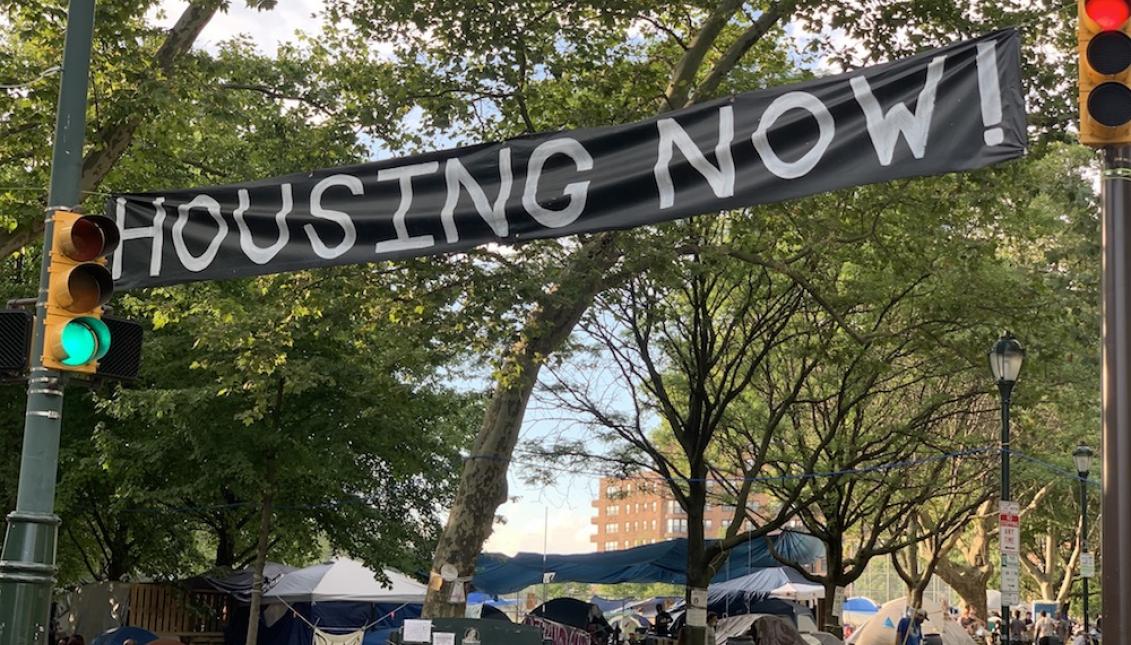
Philly continues to see an increase in encampment sweeps
It’s a national trend and affects communities across the country.
Over the last couple years, Philadelphia has become another U.S. city that’s used encampment sweeps as a way to deal with its issue of homelessness. It has been met with major protests throughout its deployment, and the events in Kensington last week are no different.
With over 100 homeless people still living in the area of Kensington Avenue between McPherson Square Park and the Allegheny Ave. El station, a planned city sweep of encampments was set to take place on June 16, as the city posted signage that read “remove property and leave this location” no later than that date.
After being met with protestors, the city cancelled the sweep, stating they no longer have plans for it. WHYY reported that activists came out to make sure there wasn’t any brutality among the police presence that was there and the homeless community.
This is not the first time the city of Philadelphia has made plans to sweep encampments. There have been several actions over the years to close four large encampments, with many leading to protests over the need for affordable housing options.
The most notable occurred over the summer of 2020, as protestors stood off with police and the Mayor’s administration for weeks, demanding more affordable housing in the city for those living in two encampments — one on the Ben Franklin Parkway and another further north, on Ridge Avenue.
Philadelphia obliged in providing some housing services to those that held out, but there are still more encampments across the city.
The latest attempted sweep in Kensington comes after many cities across the U.S. continue to experience encampment sweeps, and further efforts to deal with homeless populations.
In late May, Texas voters in the city of Austin approved Proposition B, a camping ban that made it illegal again for people experiencing homelessness to camp in public.
According to the Austin American Statesman, the ban is being rolled out slowly.
RELATED CONTENT
On June 13, it moved into a phase in which Class C misdemeanor citations could be given for failing to comply with the law.
This caused the homeless community in Austin some distress after many were confronted by police and displaced or arrested on June 14. In total, 24 tents on the corners of Guadalupe and Cesar Chavez streets were removed.
James Ford is overcome with emotion as he sits on the sidewalk while city officials remove his belongings from a homeless encampment around City Hall on Monday morning.The City of Austin camping ban Proposition B was put back in place by voters in May. Photos Ricardo Brazziell pic.twitter.com/kdspxSUk6y
— Ricardo B. Brazziell (@photo_Brazziell) June 14, 2021
In Philadelphia, the protests and outcry for compassion towards its homeless community, forced the city to implement the Philadelphia Resilience Project in early 2019. The effort’s goal is to close encampments with compassion in neighborhoods such as Kensington.
“Clearing encampments away with force and little else, as other cities have done, does not work,” Philadelphia city officials said. “It also creates distrust between the government and the very people we are trying to help. Plus, it never addresses the root cause of the problem.”
Despite efforts for cities to close encampments with compassion, communities are still left with confusion and outrage as more cities continue to enforce a clearing of encampments without providing adequate affordable housing options.
Stephanie Sena, a Villanova University expert on poverty is one community member who recognized the lack of compassion and adequate solutions for the homeless community.
As reported in the Philadelphia Inquirer, she is currently suing the City of Philadelphia, the Office of Homeless Services, and Mayor Jim Kenney over the city’s plan to clear people out of encampments.
“If we are not going to make housing available for our neighbors who need us, then we cannot also criminalize them for living,” Sena said. “The city is absolutely being disingenuous, deceptive, and confusing.”










LEAVE A COMMENT: